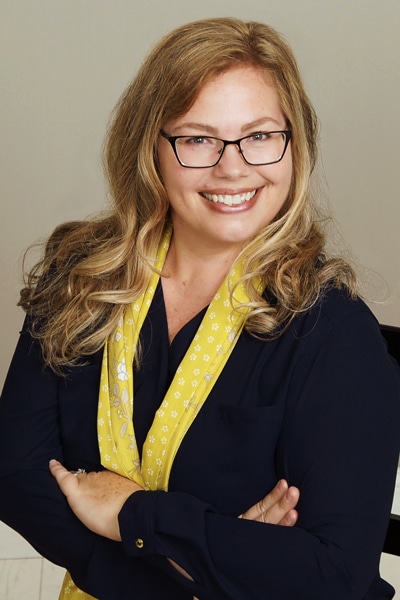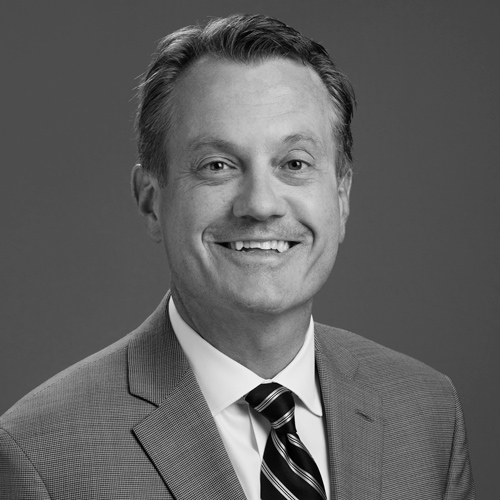When Mistee Galicia began her legal career as a deputy county attorney in Arizona, she was sure she would ultimately become a judge. But that was before she went into private practice and started specializing in medical malpractice defense. As a result, she fell in love with working in medicine and with physicians. “I quickly learned that the best way to defend a case is to delve into the details and understand the medicine at issue,” Galicia recalls. “I ended up not only loving the science of it, but also the collaboration with physicians who put their legal well-being into my hands.”
At the time, one of her clients was the insurance carrier for the Nevada System of Higher Education Board of Regents, which oversees the University of Nevada, Reno (UNR) School of Medicine. That connection led her to join the university, where she currently serves as assistant general counsel. And because of her prior experience, Galicia has a strong appreciation for the many moving parts that are required to deliver optimal medical care to the community.

“Besides treating patients promptly, accurately, and safely, care has to be precisely documented, providers need to be compassionate, and a skilled, diverse staff is necessary to help put all patients at ease,” Galicia explains. “It’s a myopic view of excellence in the delivery of medical care if you focus only on what happens in the exam room during a patient visit.”
This view has served her well at UNR Med, where she quickly realized she would be focusing on a broad range of issues that go well beyond clinical care. On any given day, Galicia may focus on insurance matters, healthcare regulations, educational and training issues, and employment and shared governance, among others. She refers to her responsibilities as “a broad intersection of healthcare and the law.”
Her expertise enables her to be a proactive voice within the School of Medicine. Beyond clarifying the requirements of statutes such as Stark (protecting against fraud) and HIPAA (safeguarding confidential patient information), she knows how to effectively assess clinical details and guide care providers in making appropriate decisions regarding their legal obligations.
“We’re uniquely positioned to equip students and residents with the tools they need to fully understand medical ethics and the rigors of compliance,” Galicia explains. “I know how to ask the right questions and develop trusting relationships so my clients—and students and residents who are still training—know I’m willing to engage with them and walk them through whatever they are facing.”
In a highly litigious society, one of the concepts that Galicia emphasizes to students and physicians alike is that poor outcomes and malpractice actions can occur even when care and medical technique is well above the prevailing standards. In one instance, she represented a highly skilled physician who successfully treated a patient’s cancer but still faced a malpractice lawsuit brought about by that patient.
“My client was so blindsided and distraught by the lawsuit that he advised his daughter, who wanted to go medical school, to choose a different career because practicing medicine was too stressful,” Galicia says. “That broke my heart. It’s why I tell our resident physicians that even though litigation comes with the territory, you can’t let it define you.”
One of the unique and challenging aspects of her role has been her responsibilities resulting from the expansion of the state’s public medical education to include a separate school of medicine at the University of Nevada, Las Vegas (UNLV). For nearly fifty years, physicians who have trained at the UNR School of Medicine have done their residencies at either Reno or Las Vegas. The Las Vegas specialty clinics included OB-GYN, surgery, pediatrics, internal medicine, and family medicine, among others. As Galicia explains, resident physicians had additional training opportunities in Las Vegas through partnerships with University Medical Center. UNR faculty physicians have also been part of this cooperative arrangement.
However, in 2013, the state legislature mandated a separate medical education and training program at UNLV as part of an effort to address a shortage of physicians in the southern portion of Nevada as well as to enhance research opportunities for UNLV. This was because the new medical school, which opened in July 2017, will now fill many of the clinical roles in the Las Vegas community previously filled by UNR. Two years of complex negotiations were required to revise contracts and agreements related to medical insurance providers, control and maintenance of medical records, third-party vendors, and a myriad of other details. For UNR, it also meant creating new community clinic and hospital partnerships for student training and residencies that are no longer readily available in Las Vegas.
For example, a patient seeing their Las Vegas-based physician the day before the new entity officially came into being would have their visit processed through an existing insurance network and other administrative process affiliated with UNR. The next day, however, those details would have switched to UNLV.
“I have been very involved in making sure that when physicians and care transition from a UNR clinic to UNLV, it happens as seamlessly as possible for the patient,” Galicia says. “We want patients to be able to maintain long-term relationships with providers and have access to their old records. The entire transition has been a massive undertaking, requiring the diligent efforts of dedicated individuals at both institutions.”
All of these changes have created an opportunity for the UNR School of Medicine to redefine itself. The resulting new strategic plan centers around five key elements: expanding its curriculum, increasing focus on graduate medical education programs, strengthening clinical and translational research, strategic recruitment, and promoting the school’s identity as an inclusive, high-quality training institution.
“At UNR Med, we have always aimed to have a local, national, and global impact through our faculty, students, the care we deliver, and the research we pioneer,” Galicia says. “Stepping back and taking stock has given us a chance to develop new strategies that will help us do all that in better and more innovative ways.”
Daehnke Stevens is proud to partner with University of Nevada, Reno School of Medicine and University of Nevada Las Vegas School of Medicine to support medical education. We are excited to celebrate Nevada’s expansion of its public medical education enterprise as University of Nevada School of Medicine Las Vegas welcomes its first class of medical students on July 1, 2017, and as University of Nevada, Reno continues to build on its nearly fifty years of experience in equipping physicians to deliver quality patient care. The team of lawyers at Daehnke Stevens are committed advocates who understand the complex legal challenges facing the medical community.


